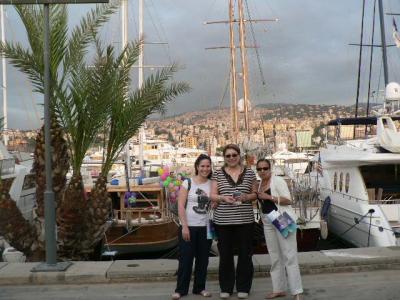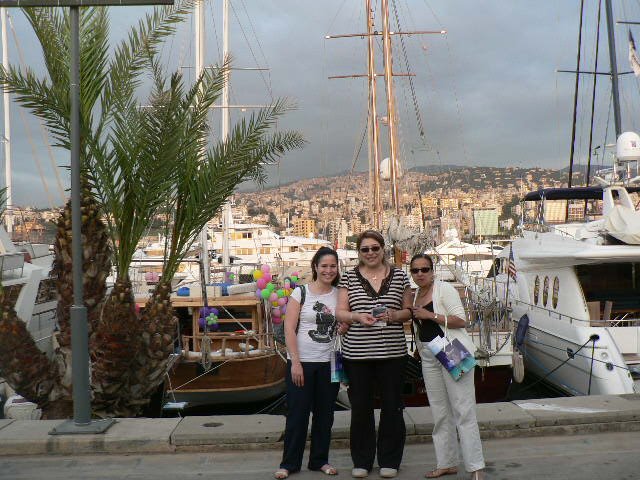Teacher takes road to Damascus
Even as a child, Wareham native Lolita Mattos always knew she wanted to live and travel abroad.
What she didn’t know was that in the years that followed, the most beautiful and most dangerous place she would ever live in was one in the same: Syria.
After 15 years teaching math at Friends Academy, an independent school in Dartmouth, Mattos suddenly decided to quit her job.
"One day I drove up to school, walked onto the campus, and the feeling came over me. 'I'm done'," said Mattos. "It was very definitive."
Mattos decided to leave her job at Friends Academy in the spring of 2009. She finished out the school year and even helped the administration find her replacement.
"Then I went 'Oh no, I just quit my job. I don't have a plan'," she said.
But, in her heart, she knew she would end up overseas.
After declining a teaching job in San Francisco, Mattos attended an international job fair in Maryland, securing interviews and offers from schools in Costa Rica, Morocco, the United Arab Emirates and Syria.
Mattos said she was drawn to Syria because her husband, who died in 2008, had been deployed in Iraq and had told her about the surrounding area.
"He had all these amazing stories and pictures and I was really intrigued," she said. "He told me how nice all the people were."
Mattos arrived in Syria in the fall of 2010. Her plane landed in the middle of the night, then she was driven through complete darkness until she saw the bright lights of Damascus.
"It was absolutely gorgeous," she said.
Mattos taught at the Damascus Community School in the Abu Ramanah neighborhood near most of the foreign embassies. The school was an American school founded in 1957 that enrolled about 300 students from early education to 12th grade. Mattos taught Algebra II to tenth-graders and middle school math and science to children from almost every continent. Not that where the students came from made much of a difference.
"No matter where you go in the world, kids are kids," she said. But she did concede there were some cultural differences. "It was strange to see them during Ramadan and being told not to drink water in front of them."
Another way students in Damascus might be similar to those from Wareham is their frenzied reaction to a snowstorm, a rarer occurrence in the Middle East than in Massachusetts.
"They were begging to go outside," Mattos said of her tenth-graders who eventually were let out and started snowball fights.
Mattos said she was surprisingly comfortable in Damascus.
"It felt like I had lived there before," she said.
She casually mentioned the time she sang Michael Jackson's "Beat it" in the Roman Theatre in Bosra, Syria, a second century amphitheater that is one of the largest and best preserved in the entire Middle East.
"Damascus is one of the most beautiful places on Earth. The ancient mixed with the new is amazing," Mattos said.
But as the school year came to an end, political unrest began to grow in Syria.
In the spring of 2011, when the first protests erupted, Mattos said there were conflicting feelings in her neighborhood. Some people told her the protests were on the outskirts of the cities and it wasn't a big deal or anything new.
Others told her "this is the beginning of the end."
One day her students came in from recess with itchy skin and burning eyes. Mattos said there was a large protest at the nearby Qatar embassy where security forces used tear gas on the protesters and the cloud of gas seeped over the school’s walls into the play area where the children were.
Being surrounded by embassies, Mattos said it was completely normal to see security officers and soldiers walking around with rifles.
As the protests became more frequent and violent in the fall of 2011, embassies began pulling out of Damascus. With them went many of Mattos' students.
The protests quickly turned to riots and eventually a full-scale civil war, which Syria is still fighting. On Jan. 22, 2012, the Damascus Community School was closed indefinitely. According to the Associated Press, more than 170,000 people have been killed in the conflict since March 2011.
When Mattos was leaving Syria in January 2012, she got a call from an American school in Beirut, Lebanon that needed help in its math department. She said she left Syria on Jan. 31, briefly saw her family in the U.S., then started working in Beirut on Feb. 4.
Mattos signed a two-year contract and later signed on for a third year ending in the spring of 2015, which she said will likely be her last in Lebanon.
"Beirut is very different from Syria. It's extremely westernized," she said. "If I had my choice between the two I would pick Damascus hands down."
She said she is definitely going back to Syria when the country is more stable. For now, Mattos thinks her next stop will be somewhere in Southeast Asia. Perhaps Bangkok, where she presented at an education workshop, or Cambodia.
"I've lost track of how many countries I've been to," Mattos said.
But she wouldn't have it any other way.
"I highly recommend the experience to anyone to live abroad," she said. "My life has changed. Once you take that leap... you're open to so many more things."













